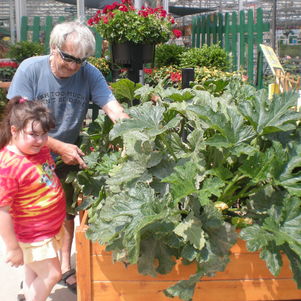Raised bed gardening is a great gardening option for many reasons. Anything from vegetables, to flowers and trees can be grown in raised beds.
Advantages
- Better Drainage – The raised bed allows compost and other organic matter to easily be added to improve the soil structure, drainage and nutrient retention. Foot traffic is eliminated so there is less compaction of the soil.
- Bigger Crops – Better root growth promotes greater yields of vegetables and stronger, more lush ornamentals.
- Longer Growing Season – Above ground soil warms more quickly so you can plant earlier. It’s also easier to incorporate stakes to allow for easier covering to protect from cold. Above ground soil may dry faster during rainy spells so that planting can continue and/or roots develop better.
- Maintenance – Chores tend to be easier due to less bending and stooping. Raised beds have a natural barrier to prevent weeds and grass.
- Creates Gardening Options – Raised beds provide an opportunity to garden where no level ground is available; decks, hillsides, roof tops. Portable beds can be moved around your property as you like and if you move, your raised bed garden can go with you. Replacing the soil allows you to plant your favorite vegetables/plants without the need to rotate.
What’s Needed
- Quality soil is a must. Fill with a light potting mix soil that includes organic matter (compost). Replace and/or amend the soil yearly.
- Raised beds on the ground should have turf and weeds removed prior to adding additional soil. Use a garden fork or spade to loosen compacted soil underneath. A sheet of hardware cloth or chicken wire with ½” to 1” openings will allow plant roots to grow into the soil bed while keeping out burrowing animals. On the ground beds need good garden soil. A mix of 65% screened topsoil, 20% compost, 10% aged manure and 5% peat should be used.
- All the nutrients the plant needs must come from the soil and/or the fertilizer that you add. Select the best appropriate fertilizer for the type of plants that you are growing.
- Water when nature doesn’t. Raised bed gardens will drain faster so more water may need to be added. In general, vegetables need 1” of water per week.


